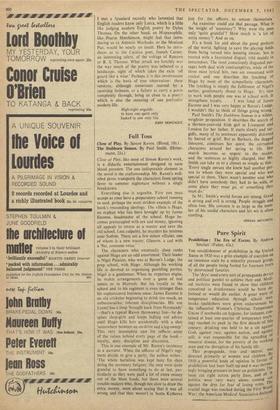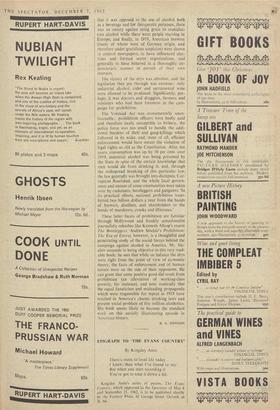Pure Spirit
Prohibition : The Era of Excess. By Andrew Sinclair. (Faber, 42s.) THE establishment of prohibition in the United States in 1920 was a grim example of coercion on an immense scale by a minority pressure group, all the people being fooled for fourteen y
by determined fanatics. The 'drys' used every sort of propaganda device and political gambit to achieve their end. Medi- cal statistics were found to show that children
s conceived in drunkenness would be born de- formed or would die earlier. A great wave of temperance education through school text- books (publishers were given endorsement by the influential Women's Christian Temperance Union if textbooks on hygiene, for instance, con- tained at least one-quarter of temperance teach- ing) reached its peak in the first decade of this century; drinking was held to be a sin against God, against race, against nation, and against; self; it was responsible for the spreading ch• venereal disease, for the poverty of the working man and the disruption of his family life. This propaganda, true and untrue, was directed primarily at women and children. BY 1910 a powerful body of opinion in favour of prohibition had been built up and it was increas- ingly bringing pressure to bear on politicians. issue cut right across party lines, and all in politics were very wary about coming „,..°1,11tt Idagainst the drys for fear of losing votes. .d crucial stage was reached during the First Wortl War : the American Medical Association declare'
that it was opposed to the use of alcohol both as a beverage and for therapeutic purposes, there was an outcry against using grain to manufac- ture alcohol while there were people starving in Europe, and finally, in 1919, American brewers (many of whom were of German origin, and therefore under gratuitous suspicion) were shown to control newspapers, to have influenced elec- tions and formed secret organisations, and generally to have behaved in a thoroughly un- democratic manner in pursuit of their own interests.
The victory of the drys was absolute, and the legislation they pm through was extreme: only industrial alcohol, cider and sacramental wine were allowed to be produced. Significantly, per- haps, it was dcictors and druggists, farmers and ministers who had been foremost in the cam- paign for prohibition.
The Volstead Act was monumentally unen- forceable: prohibition officers were badly paid and therefore easily susceptible to bribery, the police force was too small to handle the addi- tional burdens of theft and gang-killings which followed in its wake, and, most of all, efficient enforcement would have meant the violation of legal rights. as old as the Constitution. After ten years, consumption was up by 10 per cent. over 1919, industrial alcohol was being poisoned by the State in spite of the certain knowledge that men would die from drinking it, and, through the widespread breaking of this particular law, the law generally was brought into disrepute. Cor- ruption flourished, and the whole local govern- ment and unions of some communities were taken over by racketeers, bootleggers and gangsters. 'In its practical effects, national prohibition trans- ferred two billion dollars a year from the hands of brewers, distillers, and shareholders to the hands of murderers, crooks and illiterates.'
These latter facets of prohibition arc familiar through Hollywood and frankly sensationalist journalistic rehashes like Kenneth Allsop's recent The Bootleggers. Andrew Sinclair's Prohibition: The Era of Excess, however, is a thoughtful and penetrating study of the social forces behind the campaign against alcohol in America. Mr. Sin- clair succeeds in being objective in this very read- able book: he sees that while on balance the drys were right from the point of view of economic theory, the facts of enforcement and of human nature were on the side of their opponents. He can grant that some positive good did result from prohibition (an alleviation of working-class poverty, for instance), and note ironically that the equal fanaticism and misleading propaganda which were responsible for repeal in 1933 have resulted in America's chaotic drinking laws and present social problem of five million alcoholics. His book seems likely to become the standard work on this socially illuminating episode in American history.
B. S. JOHNSON







































 Previous page
Previous page